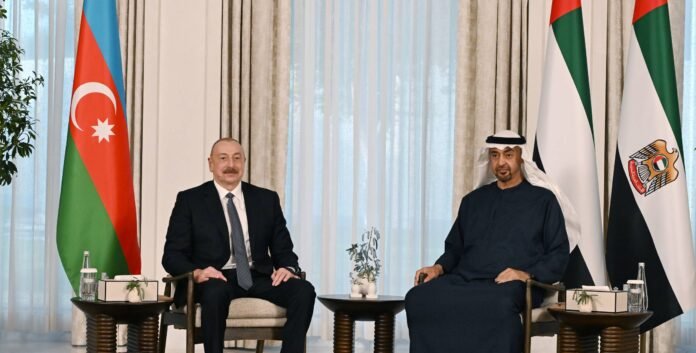UAE‑Azerbaijan economic partnership took center stage on Wednesday as President Sheikh Mohamed and President Ilham Aliyev met in Abu Dhabi. At Qasr Al Shati, they discussed deepening cooperation in economy, investment, food security, renewable energy, and the environment. The UAE‑Azerbaijan economic partnership led to the signing of a comprehensive strategic agreement. Dr Thani Al Zeyoudi and Mikayil Jabbarov signed the deal on behalf of their countries.
The UAE‑Azerbaijan economic partnership aims to boost private sector collaboration and build stronger supply chains. It also supports entrepreneurs and opens doors for businesses to expand across borders. This move builds on a strong foundation—non‑oil trade between the countries rose by 43% year‑on‑year in 2024, reaching $2.4 billion. Furthermore, the UAE stands as the top Arab investor in Azerbaijan, with investments exceeding $1 billion.
This partnership aligns with the UAE’s broader strategy of global economic diversification. It forms part of the UAE’s expansion of CEPAs—currently totaling 27—intended to ease trade and investment worldwide. Meanwhile, Sheikh Mohamed and President Aliyev also exchanged views on regional and global matters. They emphasized the need for joint action to promote peace, stability, and security.
The UAE‑Azerbaijan economic partnership further extends to environmental cooperation. Both nations recently hosted COP28 and COP29 climate summits, respectively. Their collaboration on climate action underlines a shared commitment to sustainable development.
The delegation at the summit featured UAE Vice President Sheikh Mansour bin Zayed, Deputy Ruler Sheikh Tahnoon bin Zayed, and Foreign Minister Sheikh Abdullah bin Zayed, among others. President Aliyev received a warm welcome from top Emirati officials upon his arrival.
Altogether, the UAE‑Azerbaijan economic partnership marks a significant milestone. It cements a growing strategic alliance, driving business growth, enhancing regional stability, and reinforcing global environmental cooperation. With this agreement in place, both nations are well positioned to accelerate joint development in a wide range of sectors.


